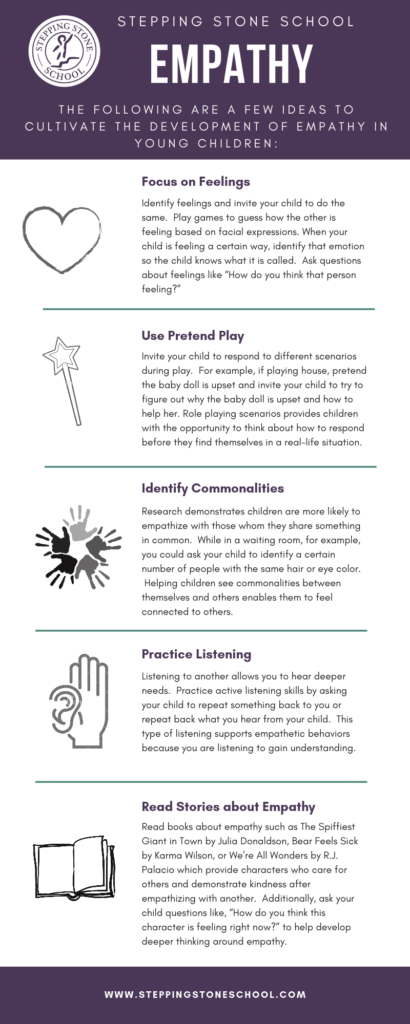5 Ways to Develop Empathy
This month at Stepping Stone School, we are focusing on the development of Empathy as a part of our Communities of Character™ curriculum. Empathy is a key aspect of emotional intelligence through which individuals imagine what another is experiencing as if feeling it themselves.
Empathy is a complex skill to develop. First, a child must be able to recognize others have different thoughts and feelings than he has. Secondly, he must imagine himself in a similar situation to determine a possible solution to the problem the other child is experiencing.

The following are a few ideas to cultivate the development of empathy in young children:
- Focus on Feelings: Identify feelings and invite your child to do the same. Play games to guess how the other is feeling based on facial expressions. When your child is feeling a certain way, identify that emotion so the child knows what it is called. Ask questions about feelings like “How do you think that person feeling?”
- Use Pretend Play: Invite your child to respond to different scenarios during play. For example, if playing house, pretend the baby doll is upset and invite your child to try to figure out why the baby doll is upset and how to help her. Role playing scenarios provides children with the opportunity to think about how to respond before they find themselves in a real-life situation.
- Identify Commonalities: Research demonstrates children are more likely to empathize with those whom they share something in common. While in a waiting room, for example, you could ask your child to identify a certain number of people with the same hair or eye color. Helping children see commonalities between themselves and others enables them to feel connected to others.
- Practice Listening: Listening to another allows you to hear deeper needs. Practice active listening skills by asking your child to repeat something back to you or repeat back what you hear from your child. This type of listening supports empathetic behaviors because you are listening to gain understanding.
- Read Stories about Empathy: Read books about empathy such as The Spiffiest Giant in Town by Julia Donaldson, Bear Feels Sick by Karma Wilson, or We’re All Wonders by R.J. Palacio which provide characters who care for others and demonstrate kindness after empathizing with another. Additionally, ask your child questions like, “How do you think this character is feeling right now?” to help develop deeper thinking around empathy.
Developing empathy takes time and patience, but with the support of loving parents and caregivers, children will learn how to relate to others and respond with care and kindness.

Resources:
Lahey, J. (2014, September 4). Teaching Children Empathy. Retrieved From https://Parenting.Blogs.Nytimes.Com/2014/09/04/Teaching-Children-Empathy/
Lerner, C. and Parlakian, R. (2016, Feb 1). How to Help Your Child Develop Empathy. Retrieved from https://www.zerotothree.org/resources/5-how-to-help-your-child-develop-empathy
Morgan, L. (2006, DECEMBER 01). Teaching Kindness and Empathy to Children. Retrieved from https://www.Parentmap.Com/Article/Teaching-Kindness-And-Empathy-To-Children
Parlakian, R. & Lerner, C. (2009, July). “Tips on Helping Your Child Develop Empathy.” Retrieved from http://www.zerotothree.org/child-development/social-emotional-development/take-a-walk-in-my-shoes.html